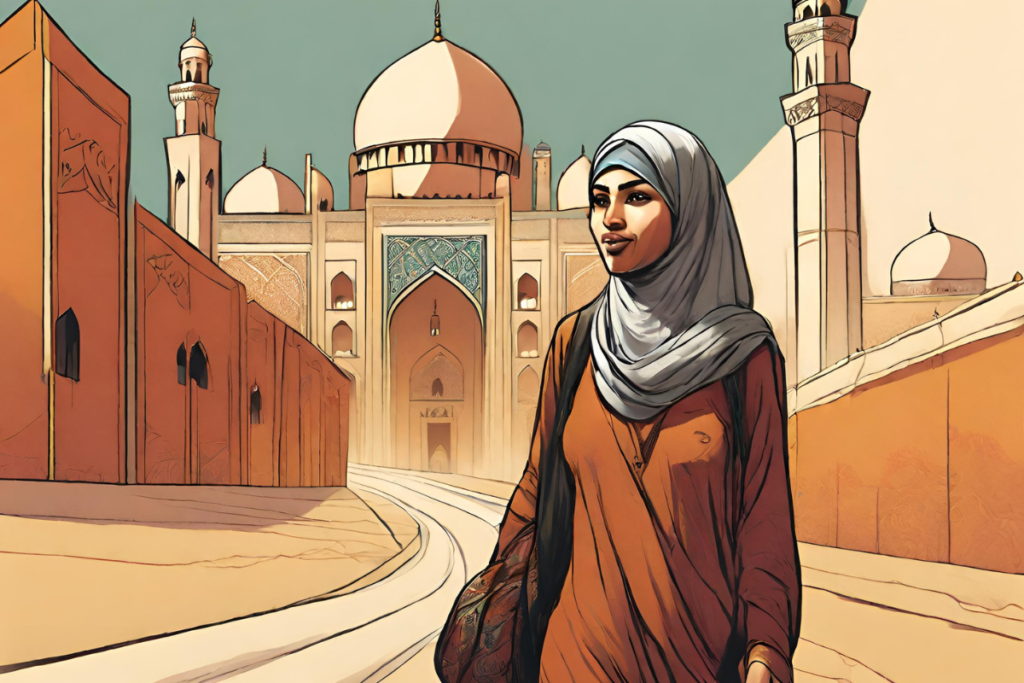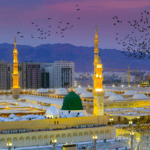بِسْمِ ٱللَّٰهِ ٱلرَّحْمَٰنِ ٱلرَّحِيمِ
Travel is a part of life’s tapestry, but in Islam, there are specific guidelines. Let’s dive into the hadith that outlines restrictions on women’s travel.
Hadith about Women’s Travel
حَدَّثَنَا أَحْمَدُ بْنُ مَنِيعٍ، حَدَّثَنَا أَبُو مُعَاوِيَةَ، عَنِ الأَعْمَشِ، عَنْ أَبِي صَالِحٍ، عَنْ أَبِي سَعِيدٍ الْخُدْرِيِّ، قَالَ قَالَ رَسُولُ اللَّهِ صلى الله عليه وسلم ” لاَ يَحِلُّ لاِمْرَأَةٍ تُؤْمِنُ بِاللَّهِ وَالْيَوْمِ الآخِرِ أَنْ تُسَافِرَ سَفَرًا يَكُونُ ثَلاَثَةَ أَيَّامٍ فَصَاعِدًا إِلاَّ وَمَعَهَا أَبُوهَا أَوْ أَخُوهَا أَوْ زَوْجُهَا أَوِ ابْنُهَا أَوْ ذُو مَحْرَمٍ مِنْهَا ” . وَفِي الْبَابِ عَنْ أَبِي هُرَيْرَةَ وَابْنِ عَبَّاسٍ وَابْنِ عُمَرَ . قَالَ أَبُو عِيسَى هَذَا حَدِيثٌ حَسَنٌ صَحِيحٌ .
The Messenger of Allah said: “It is not lawful for a woman who believers in Allah and the Last Day to travel on a trip that is three days or more, unless she is accompanied by her father, her brother, her husband, her son, or someone who is a Mahram to her.”
وَرُوِيَ عَنِ النَّبِيِّ صلى الله عليه وسلم أَنَّهُ قَالَ ” لاَ تُسَافِرُ الْمَرْأَةُ مَسِيرَةَ يَوْمٍ وَلَيْلَةٍ إِلاَّ مَعَ ذِي مَحْرَمٍ ” . وَالْعَمَلُ عَلَى هَذَا عِنْدَ أَهْلِ الْعِلْمِ يَكْرَهُونَ لِلْمَرْأَةِ أَنْ تُسَافِرَ إِلاَّ مَعَ ذِي مَحْرَمٍ . وَاخْتَلَفَ أَهْلُ الْعِلْمِ فِي الْمَرْأَةِ إِذَا كَانَتْ مُوسِرَةً وَلَمْ يَكُنْ لَهَا مَحْرَمٌ هَلْ تَحُجُّ . فَقَالَ بَعْضُ أَهْلِ الْعِلْمِ لاَ يَجِبُ عَلَيْهَا الْحَجُّ لأَنَّ الْمَحْرَمَ مِنَ السَّبِيلِ لِقَوْلِ اللَّهِ عَزَّ وَجَلَِّ : ( لِمَنِ اسْتَطَاعَ إِلَيْهِ سَبِيلاً ) فَقَالُوا إِذَا لَمْ يَكُنْ لَهَا مَحْرَمٌ فَلاَ تَسْتَطِيعُ إِلَيْهِ سَبِيلاً . وَهُوَ قَوْلُ سُفْيَانَ الثَّوْرِيِّ وَأَهْلِ الْكُوفَةِ . وَقَالَ بَعْضُ أَهْلِ الْعِلْمِ إِذَا كَانَ الطَّرِيقُ آمِنًا فَإِنَّهَا تَخْرُجُ مَعَ النَّاسِ فِي الْحَجِّ . وَهُوَ قَوْلُ مَالِكِ بْنِ أَنَسٍ وَالشَّافِعِيِّ .
Source: Jami` at-Tirmidhi 1169
Narrated by: Abu Sa’eed al-Khudri (RA)
The Prohibition on Women’s Solo Travel
In the bustling world of today, the hadith reminds us of a simple yet significant principle: a woman shouldn’t embark on a journey of three days or more alone. It’s not a matter of restriction but a consideration for her well-being.
Understanding the Mahram Relationships
Mahram – a word that holds immense importance. Fathers, brothers, husbands, and sons fall into this category, and they play a crucial role in accompanying women on more extended trips.
It’s not about limitations but about creating a supportive environment.
Safety and Protection
The essence of the hadith lies in safeguarding women. Traveling alone, especially for an extended period, can expose them to various risks.
The requirement for a Mahram is not just a tradition; it’s a protective measure woven into the fabric of Islamic teachings.

Preservation of Modesty and Virtue
Islam places a high value on the modesty and virtue of women. The hadith reflects this principle, guiding us to consider the cultural and societal contexts that contribute to preserving these qualities.
It’s not about restrictions but about creating an atmosphere that respects and protects women.
Practical Implications and Modern Considerations
In a world that’s always on the move, how do these guidelines fit into modern life? It’s about striking a balance.
While the hadith is clear about the ideal scenario, it’s crucial to consider the practical implications. What if a woman needs to travel without a Mahram?
Nurturing a Nuanced Understanding
The hadith is not a rigid rule but a guideline, adaptable to various circumstances. It’s about nurturing a nuanced understanding of the underlying principles.
Safety, protection, and the preservation of virtue are at its core, providing a flexible framework that considers the diverse situations women may find themselves in.
Conclusion about women’s travel in Islam
In our journey through the guidelines on women’s travel in Islam, we find a rich tapestry of wisdom and care. It’s not about imposing restrictions but about creating a supportive environment that considers the safety, protection, and dignity of women.
As we navigate the complexities of modern life, let’s carry this understanding with us – a reminder of the timeless principles that shape Islamic teachings.
As always, do share this article out to all of your family and friends. May it be one of the long lasting good deeds that rewards us well. Here and in the hereafter, InsyaAllah.










